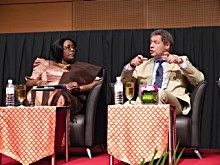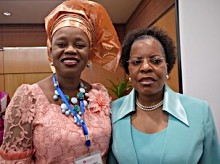Voices from the Global Forum on Cervical Cancer Prevention

On the prevention of cervical cancer
“Developing countries face a ‘triple whammy’ with regards to cervical cancer because of the high incidence of HPV, late or limited HPV screening, and worst outcome. The co-infection of HIV and HPV also presents a challenge in these countries, not only increasing the burden of cervical cancer, but increasing HPV infection rates.”
GAVI CEO Dr Seth Berkley
“Cervical cancer is one of the issues we need to deliver on for girls and women. It is not just a health issue, but an issue of equality, empowerment and access.”
Jill Sheffield, President, Women Deliver, which will follow the Global Forum by hosting one of the largest conferences ever on women’s health & empowerment.
“Universal access to cervical cancer prevention is now. The question is not if, the question is when cervical cancer will be eliminated.”
David Gold, Founder and Principal of Global Health Strategies
On the human papillomavirus (HPV) vaccine, which protects young girls against the main cause of cervical cancer

“I became an ambassador to build awareness for Pap smears and vaccinations so no other woman would have to go through what I did.”
Genevieve Sambhi, cervical cancer survivor and Ambassador for Power Over Cervical Cancer in Malaysia
“For every 1,000 girls who get the HPV vaccine, 13 lives are saved. Right now we have a unique opportunity to chart the path for cervical cancer prevention.”
Jill Sheffield, President, Women Deliver, noting that in the absence of access to screening and treatment for far too many women in poor countries, the HPV vaccine is the only means to prevent cervical cancer.
“HPV vaccines are a major step forward in tackling cervical cancer and the lower HPV price is a great achievement.”
Dr Marleen Temmerman, Director of Reproductive Health and Research at WHO
On the need to introduce the HPV vaccine in low-income countries
“The challenge is how do we get vaccines to the places where they are needed the most. We need to secure political support and get high HPV coverage quickly, reaching the hard to reach.”
GAVI CEO Dr Seth Berkley, who noted of the 43 countries that have introduced the vaccine since it became available in 2006, only three are low-income countries.
“All our girls deserve a chance to live in a world free from cervical cancer.”
Dato’ Dr Maimunah Abdul Hamid, Deputy Director of General Health from Malaysia’s Health Ministry, highlighting Malaysia’s proactive efforts in tackling cervical cancer. Since 2011, the Government has made the HPV vaccine available for free to girls in schools across the country, covering 95% of girls.

“2013 marks an historic moment in the fight against the disease. On 4 February, World Cancer Day, GAVI approved support for the introduction of the vaccine against HPV in many African countries. Ghana, Kenya, Madagascar, Malawi, Niger, Sierra Leone and Tanzania will be among the first countries to receive support for the protection of girls between nine and 13 years old.”
Her Excellency Dr. Maria da Luz Dai Guebuza, First Lady of Mozambique
“With the new low price that GAVI secured for the HPV vaccine, low-income countries will now be able to protect girls from cervical cancer, and we will get closer to bridging the gap between rich and poor countries when it comes to accessing the vaccine. ”
GAVI CEO Seth Berkley, who added that as the HPV vaccine market gets larger, the prices will drop further.
